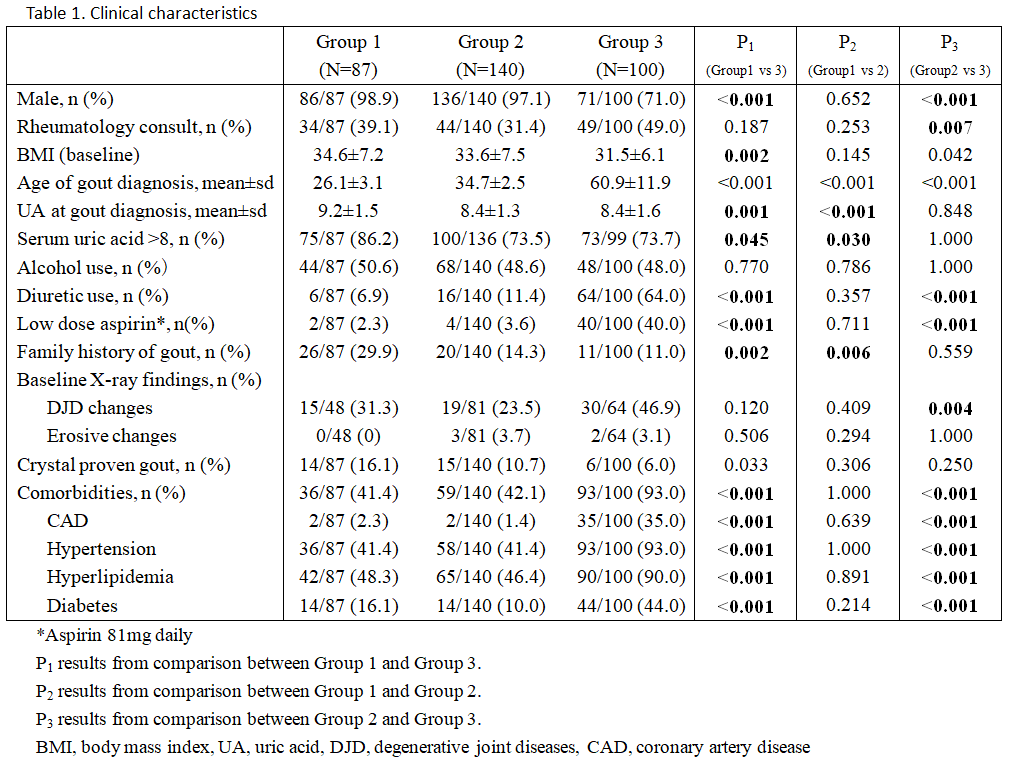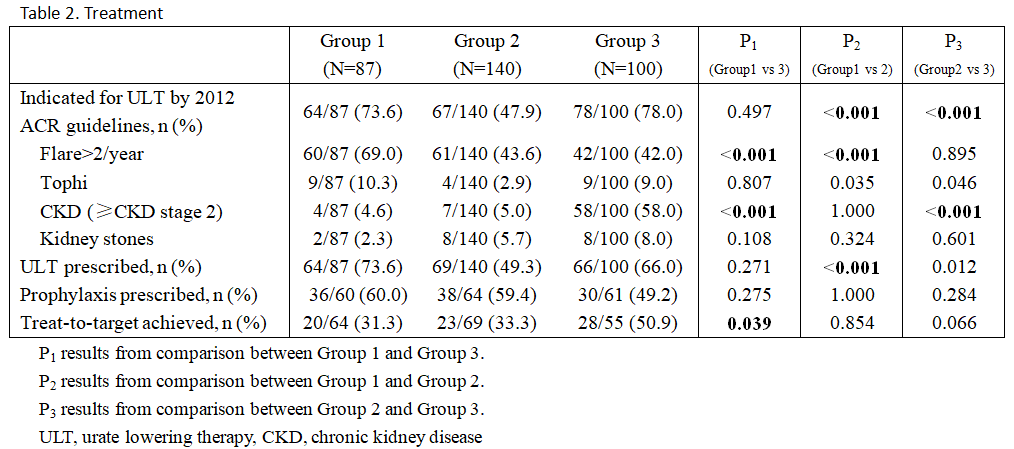Session Information
Date: Tuesday, October 23, 2018
Title: Metabolic and Crystal Arthropathies – Basic and Clinical Science Poster II
Session Type: ACR Poster Session C
Session Time: 9:00AM-11:00AM
Background/Purpose: There has been an increase in the prevalence of gout over the past two decades, with increasing number of patients presenting at younger age. The clinical characteristics, including comorbidities, concomitant medications, treatment compliance and outcome, have been described in patients with gout, although few studies are available in patients with early onset gout.
Methods: We retrospectively reviewed 327 patients (>=18 years of age) with a diagnosis of gout from 2008 to 2016 using the database of a multispecialty group practice in New England. Patients with >= 2 diagnosis of gout per ICD 10 code (M10.*) or ICD-9 code (274.xx) recorded on >= 2 dates, or 1 diagnosis of gout and >= 1 pharmacy prescription of gout-related medications were identified. Patients were classified into age first diagnosed < 30 (Group 1), age 30-40 (Group 2) and age >40 (Group 3). All charts of patients with age <= 40 by the index date were reviewed, with exclusion of those who did not meet the 2015 ACR/EULAR gout classification criteria or without adequate information. Then, we randomly selected and reviewed 100 out of 7216 patients from Group 3. Clinical characteristics and treatment were compared among the three groups.
Results: We identified 87 patients in Group 1 and 140 patients in Group 2. Patients within Group 1 had significantly higher male/female ratio, body mass index and uric acid level at the time of diagnosis (Table 1). Positive family history of gout was more frequently identified in Group 1. While the prevalence of cardiovascular risk factors was higher in elderly patients, the proportion of patients with hypertension and hyperlipidemia was unexpectedly high within Group 1 (41.4% and 48.3%, respectively). The X-rays of peripheral joints available at the time of gout diagnosis exhibited degenerative changes in 24-47% of patients in different age groups; while erosive changes consistent with gout were found only in few patients. The majority of patients in Group 1 fulfilled the 2012 ACR guidelines for initiating urate lowering therapy (ULT) on the basis of frequency of gout attacks, shown in Table 2. The majority of patients in Group 3 fulfilled the 2012 ACR guidelines for ULT on the basis of chronic kidney disease.
Conclusion: In our population, patients aged <= 40 were less likely to achieve target uric acid levels than older patients. In addition, patients with early onset gout frequently have cardiovascular risk factors. Clinicians should be aware that patients with early onset gout may be an undertreated population at increased risk for recurrent gout and cardiovascular diseases.
To cite this abstract in AMA style:
Li Y, Piranavan P, Sundaresan D, Yood RA. Clinical Characteristics of Early Onset Gout in Outpatient Setting [abstract]. Arthritis Rheumatol. 2018; 70 (suppl 9). https://acrabstracts.org/abstract/clinical-characteristics-of-early-onset-gout-in-outpatient-setting/. Accessed .« Back to 2018 ACR/ARHP Annual Meeting
ACR Meeting Abstracts - https://acrabstracts.org/abstract/clinical-characteristics-of-early-onset-gout-in-outpatient-setting/


